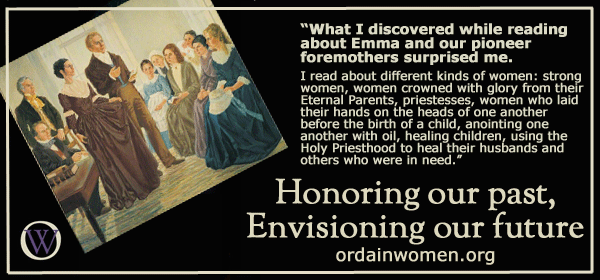For as long as I can remember, I have been told how to be a woman: my hair is my crowning glory, I am to serve and revere my husband (having a husband is the only option to be complete), meekness is the most desirable quality I could possess, faithful women are rare so I must be a ruby among the unpolished stones. Womanhood was not about being empowered, or strong, or even autonomous. I was left hoping for something more. Something better.
As I am a lover of history, I had been doing a great deal of reading about women in the Church. I have always loved Emma Smith for her powerful example of what I imagined was the embodiment of “woman.” What I discovered while reading about Emma and our pioneer foremothers surprised me. Could it really be that women were giving blessings to one another? How was this possible? I shelved these ideas and thoughts for 12 years for fear of being labeled as “apostate” for thinking such things were really what they claimed to be. With the release of the Joseph Smith Papers Project, more light was opened on this subject for me.
I read about different kinds of women: strong women, women crowned with glory from their Eternal Parents, priestesses, women who laid their hands on the heads of one another before the birth of a child, anointing one another with oil, healing children, using the Holy Priesthood to heal their husbands and others who were in need. All of this done before the correlation of the Relief Society and the stripping of our ability—your ability, my ability—to perform priesthood responsibilities, without authorization from a male to do so behind the closed doors of our temples. I ached for this during my own pregnancies but words could not be formed to describe those emotions.
For me, honoring this heritage and tradition is as important as looking toward the future and holding a space of hope for change; it is remembering this part of myself. Remembering it in the full sense of the word: to go back to. To go back to a space of oneness and wholeness with the person I am created to be. It has nothing to do with power or authority for me. It has everything to do with reclaiming that which was taken without permission or consent. I want better for me. I want better for the women in our faith tradition. I want better for my mothers and my sisters and my daughters.
My daughters deserve to know the legacy left for them by these women. They deserve to know their right and rite within the rich ritual of laying their hands upon the heads of those who call on them for healing and comforting. They deserve to have that space within them filled again and return to a state of wholeness, even if they may not be able to put into words yet what that empty space feels like. But they know it is there, just as I knew it was there. As I sit here, I am nursing my sweet daughter and telling her the wonderful stories of women who went before her and hope that I may add my story to theirs one day as a woman who discovered who she was: someone no longer afraid to take off the bushel basket from my candle—someone who dared to share my light.
Honoring our past, envisioning our future
Ordain Women
Rachel Wachs, the author of this post, has a profile on Ordain Women.






